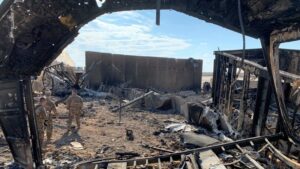The killing this week of Qassem Sulemaini underscores a fundamental question about the crisis that was thrust on this country on 9/11: How we do declare victory in a war against international terrorism?
Sulemaini led the Iranian Revolutionary Guard. He had buckets of American blood on his hands. He needed to be hunted down and killed. And so it happened in a drone strike in Baghdad, Iraq, where he and his forces have been fighting against Iraqis and U.S. troops.
More than 18 years ago this country was dragged into a war of someone else’s choosing. Al-Qaeda terrorists pulled off a stunning and cunning surprise attack on this country from which we likely never will recover emotionally, at least not as long as there are Americans still living who remember that terrible day in 2001.
We went to war. President Bush said at the time that our fight was not with Muslims, but with those who perverted their faith into a demented justification for the act of evil.
And so the fight has gone on and on.

Our special operations forces killed al-Qaeda mastermind Osama bin Laden in May 2011. They went into action again in October of this past year and killed Abu Bakr al-Baghdadi, the leader of the Islamic State. They, too, needed to die. Did their deaths or the death of Sulemaini spell the end of their terror networks? No. They all found someone to replace them; Sulemaini’s deputy commander has stepped into the commander’s role in Iran.
I don’t intend to suggest this country should give up fighting the terrorist monsters. I merely intend to seek to put this fight into what I hope is a proper perspective.
We should acknowledge that terrorists have existed since the beginning of civilization. The 9/11 attack at the beginning of this century emboldened them. They have become more brazen than before. Moreover, the rest of us are paying more careful attention to their hideous rhetoric and, yes, their actions.
We can take some comfort in the tactical victories our side is able to score: the deaths of terror leaders and the battlefield successes we can secure as we seek to defeat the terrorist monsters.
I cannot stop wondering, however, whether a declaration of victory against terror is even possible. The terrorists, I fear, possess a deep bench full of lunatics who are willing to die for some perverted cause.
Therefore, the fight must continue.







